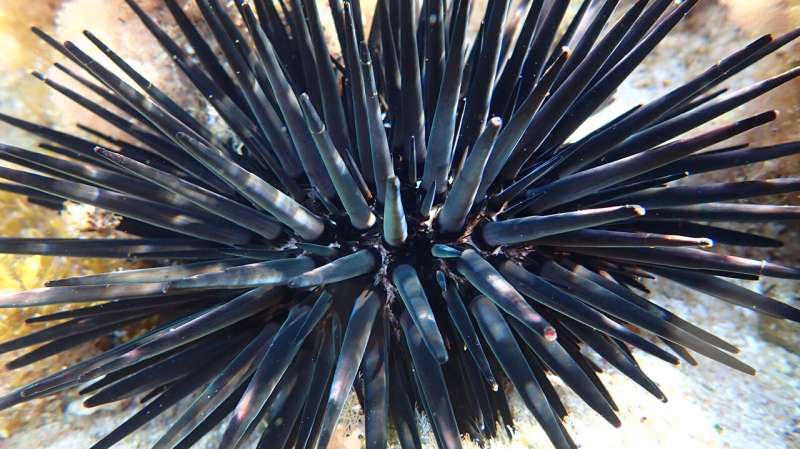This article has been reviewed according to Science X's editorial process and policies. Editors have highlighted the following attributes while ensuring the content's credibility:
fact-checked
peer-reviewed publication
trusted source
proofread
Marine heatwaves decimate sea urchins, mollusks and more at Rottnest

Curtin University researchers believe rising sea temperatures are to blame for the plummeting number of invertebrates such as mollusks and sea urchins at Rottnest Island off Western Australia, with some species having declined by up to 90 percent between 2007 and 2021.
Lead author Adjunct Professor Fred Wells, from Curtin's School of Molecular and Life Sciences, said the west end of Rottnest Island had suffered a "catastrophic decline" in biodiversity.
"Since 1982, we have monitored biodiversity of marine molluscs and echinoderms including sea snails, clams, starfish and sea urchins on rocky reefs at Rottnest Island, Cottesloe, Trigg Point and Waterman," Professor Wells said.
"Despite being sanctuary zones with the highest level of protection from human activities, we found that Radar Reef and Cape Vlamingh at Rottnest Island had suffered a catastrophic decline in biodiversity between 2007 and 2021, likely due to exposure to the warm Leeuwin Current.
"By contrast, the metropolitan coastline, which is not under the influence of the Leeuwin Current, was found to have well-preserved biodiversity and species richness.
"Overall, at the west end of Rottnest Island, the rocky reefs are badly depleted with a decline of 90 percent or more in biodiversity and density of molluscs.
Professor Wells said a number of marine heatwaves on the west coast of WA in recent years that caused abnormally high ocean temperatures had impacted the area's marine plant and animal populations.
"Our surveys in 1982 and 2007 showed Radar Reef and Cape Vlamingh had a mixture of tropical, temperate and WA endemic species. With increased sea temperatures we expected to see the proportion of tropical species increase, but this did not happen at the West End of Rottnest where all three groups declined substantially," Professor Wells said.
"These findings demonstrate that even with the high degree of protection from direct human activities, these areas are not immune to the effects of global climate change.
"As far as we know, molluscs and echinoderms on other rocky reefs at Rottnest and other areas off the metropolitan coast are in reasonable numbers and we hope that in the near future these can provide larvae for repopulating Radar Reef and Cape Vlamingh."
Published in Frontiers in Marine Science, the research is titled "Responses of intertidal invertebrates to rising sea surface temperatures in the southeastern Indian Ocean."
More information: Fred E. Wells et al, Responses of intertidal invertebrates to rising sea surface temperatures in the southeastern Indian Ocean, Frontiers in Marine Science (2023). DOI: 10.3389/fmars.2023.1075228
Journal information: Frontiers in Marine Science
Provided by Curtin University
















